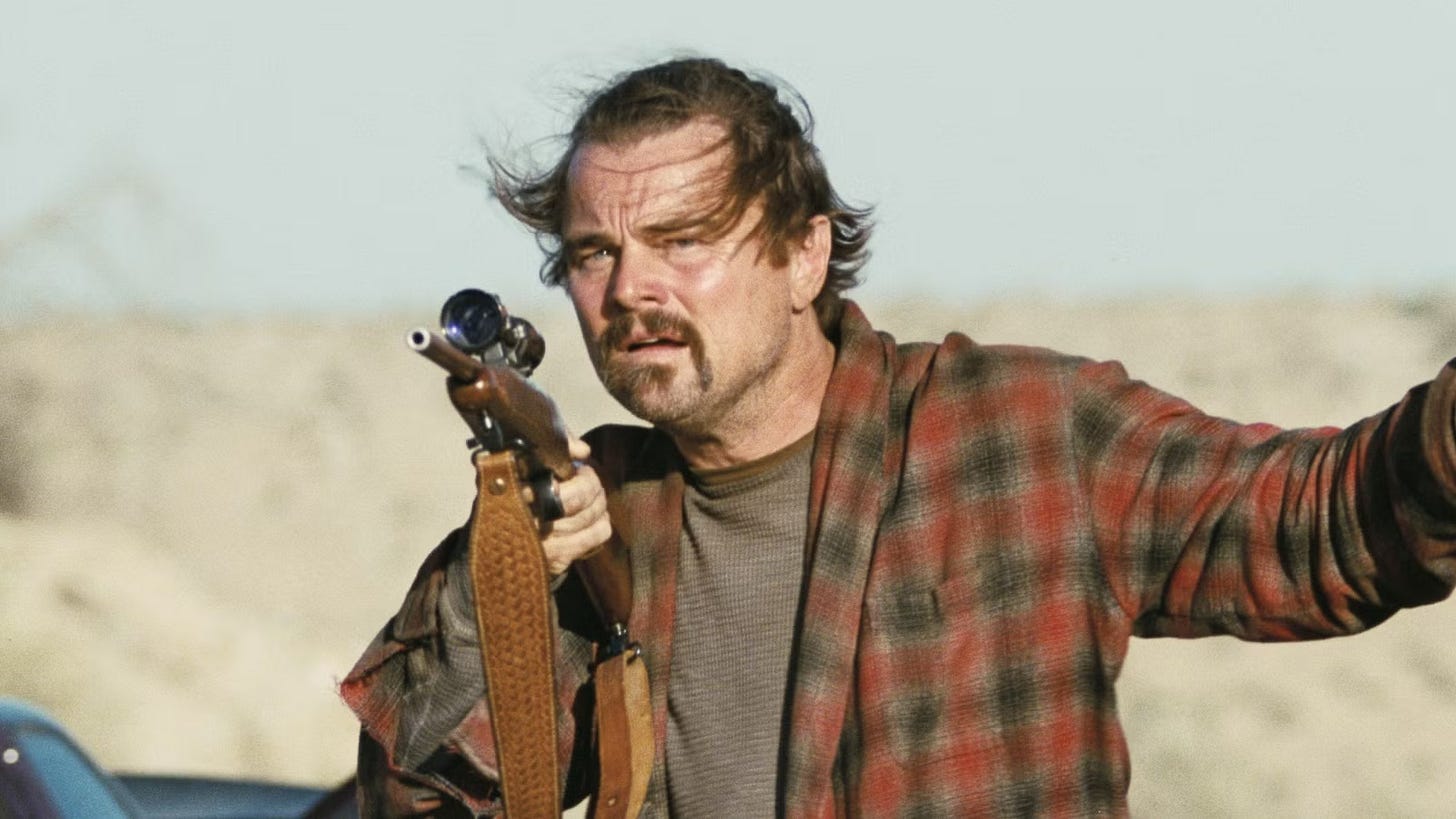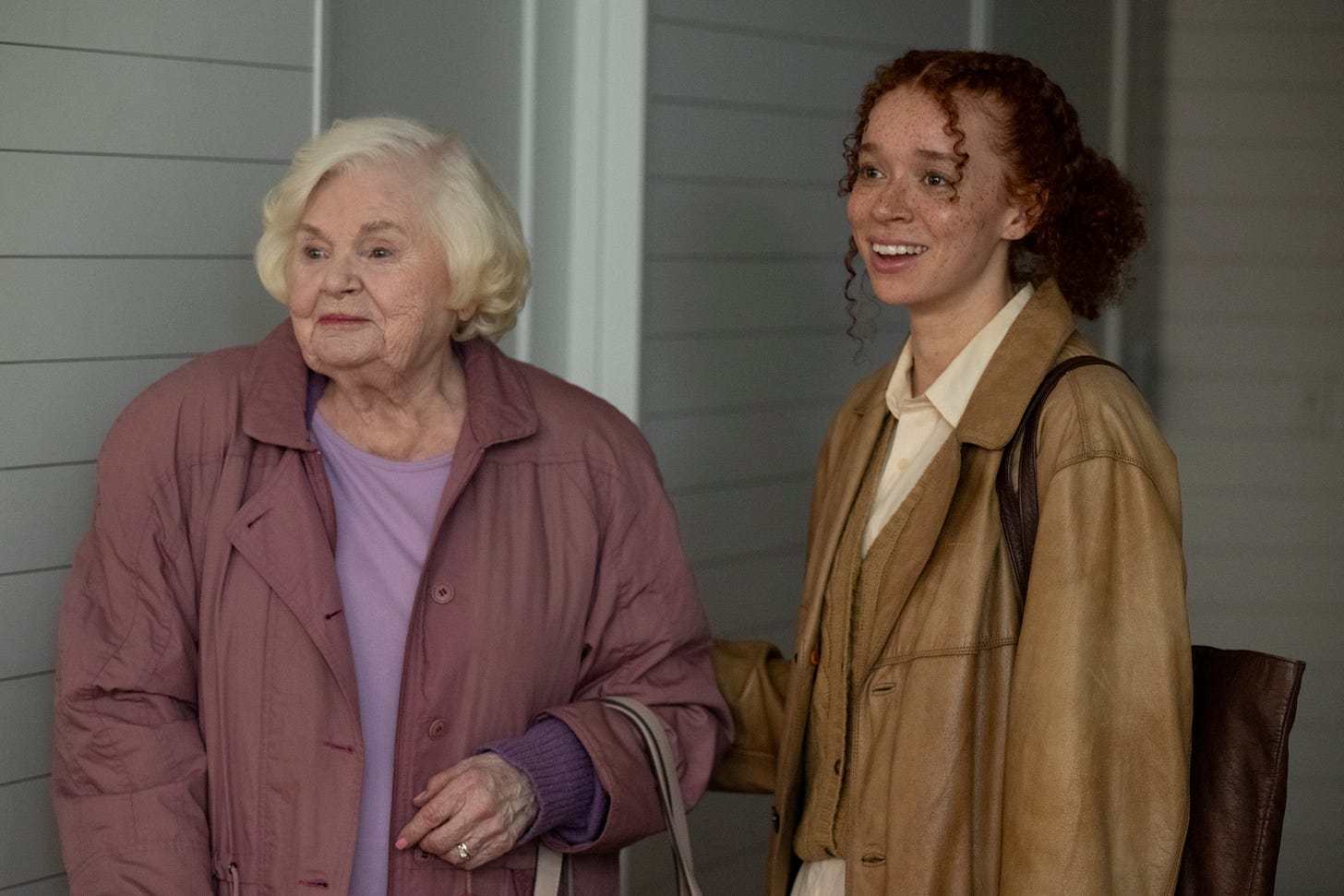'One Battle After Another' is the movie of the year
PTA delivers a thrilling, surreal, funny and trenchantly political action thriller.
One Battle After Another is like nothing Paul Thomas Anderson has made before. The deliberate, sometimes meditative, pacing of There Will Be Blood and The Master is replaced by a propulsive, nerve-shredding rhythm. Rather than look back at a specific setting – the ‘70s porn scene, post-War America, the oil boom – it takes place just minutes from now; although it’s inspired by a 35-year-old novel set in Reagan’s America, its politics feel ripped from today’s social media feeds. It’s the movie of the moment, and possibly the best film of the year.
Leonardo DiCaprio stars as an explosives expert working for the first time with a group of revolutionaries known as the French 75 to liberate immigrants from a U.S. detention center. He collaborates with – and immediately falls for – the group’s leader, Perfidia Beverly Hills (Teyana Taylor), who builds on their success by waging war against the fascists ruling the nation. That is, until she runs afoul of Capt. Lockjaw (Sean Penn), whom she sexually humiliates. Lockjaw dedicates himself to bringing in the French 75, and finds himself transfixed with its leader, and the group is eventually scattered to the winds.
Cut to 16 years later. DiCaprio’s character now goes by the name Bob and lives in a small California town raising his and Perfidia’s teenage daughter, Willa (Chase Infiniti), on his own. He’s no longer the excited revolutionary building bombs in the basement; instead, he sits around in a robe getting high, paranoid about the world into which he sends his daughter. But just because you’re paranoid doesn’t mean they’re not out to get you, and Lockjaw reintroduces himself into Bob’s life with a vengeance. Willa finds herself suddenly drawn into her parents’ past lives while Bob has to recover the revolutionary spirit he thought was left behind to save his daughter.
Inspired by Thomas Pynchon’s 1990 novel Vineland – but taking its own detours and exploring its own tangents – One Battle After Another feels eerily prescient. Soldiers march down American streets apprehending immigrants. Its band of revolutionaries resonate in an age where resistance is constantly in the ether. And its examination of politics and their racial and faith dynamics – Lockjaw’s obsession with Perfidia, a Black woman, might prohibit his membership with the Christian nationalist white supremacist group he’s been invited to join – is searingly on point. It’s the right movie for these fraught days.
But while One Battle After Another is loudly and proudly political, it never feels like a polemic. Anderson sets the film just a few minutes ahead of right now, in a world that’s almost, but not quite, a mirror image of our own. The Christian nationalist group is not a coalition of evangelical nutjobs, but rather a secret group of high-powered white men who worship Santa Claus. Underground networks have been established to easily hide immigrants at risk of being rounded up. And while Lockjaw has a lot in common with white, fragile, angry men, there’s enough nuance and personal obsession driving him to avoid cliche. It’s timely, but the filter of fiction keeps audiences from getting distracted by seeking out every parallel; it also means that the film will likely be evergreen.
It also helps that One Battle After Another is just so damn entertaining. True to its title, the movie jumps from one event to the next, a collection of rapid-fire pursuits, chases and evasions. Anderson employs long shots without being self-indulgent – an extended sequence where Bob accompanies Willa’s karate instructor (Benicio del Toro) as he tries to organize a community evacuation is a nerve-wracking high point – while Johnny Greenwood’s jangly piano score ratchets up the tension. The movie constantly moves forward, weaving in weird digressions – marijuana-growing nuns who help the resistance and, again, a cabal of Saint Nick worshippers – without batting its eyes. By the time the movie hit its white-knuckled car chase climax, I was shocked to see that nearly three hours had passed.
I was a bit nervous going into our screening, as the marketing team heavily played up the memeability of DiCaprio’s performance; attendees took home branded beanies and giant sunglasses, similar to what Bob dons at different points, and there were goatees-on-a-stick that the crowd donned for a photo op. I worried that this was going to be a broad attempt to create a new stoner hero at the expense of an actual performance.
And there are Lebowski-esque parallels. Bob is a stoner who is often befuddled as he brushes up against the activists who have taken his place – a very funny running joke concerns his ability to remember the codewords the French 75 uses to recognize its members. And while DiCaprio’s the lead, I don’t know that it’s quite accurate to call him the hero. Bob bumbles through the revolution, and often only evades capture by accident. The real heroes are in his periphery, picking up the mission he started and then let pass him by as he grew fat and lazy; at the end of the film, Bob’s accomplished exactly nothing on his own, but the power of the performance is that he ends the story reawakened and in a new place as a parent.
DiCaprio has played parents before, but this is one of the rare roles in which that identity is central to his performance. Bob checks out of the activism and mission as his marriage disintegrates and the priorities of raising a child and his desire to protect Willa from the world take over. He still has a soft spot for the old days – he tells Willa about her mother but leaves out crucial details, and his way of unwinding is to watch The Battle of Algiers – but he’s also paranoid and terrified about the world in which he’s raising his daughter. While DiCaprio is often very funny, the actor grounds everything around Bob’s love for his daughter that provides an emotional center of gravity. This is a movie just as much about parenting as it is about politics, a story about raising children who will grow up to fight the right battles, and trusting that they’re capable enough to do so.
DiCaprio’s face is on all the posters, but, like many Anderson films, One Battle After Another is a solid ensemble work. Chase Infiniti, in particular, is fantastic in her feature debut, playing a kid who has her mother’s smarts and desire to run into danger, and has an exasperated but loving relationship with her father. Del Tor is all Zen cool as Willa’s karate sensei who also is a quiet hometown hero who walks away with the film’s best lines (“No fear. Like Tom f—ing Cruise.”). Regina Hall is great as a French 75 member who helps shepherd Will to safety. And Penn might walk away with the best performances in the film as Lockjaw, who walks with a ramrod straightness that suggests a giant stick up his ass and whose depiction of grizzled, tense masculinity feels like parody until you realize he’s playing a man about to come loose with fear, anger and anxiety and is putting on a performance so everyone sees him as the badass he hopes to be.
One Battle After Another is a film with so much going on that I can’t wait to revisit it, nitpick it, and examine it again. But it never gets weighed down by its mysteries or inaccessibility – a problem that sometimes plagues PTA’s work. In the moment, it’s surreal, thrilling and funny. But on the ride home, I was astonished by what a meal Anderson had delivered. This is not just one of the best films of the year – it’s likely to be on the list of best films of the decade.
Also in theaters
Eleanor the Great
I’d originally planned to write a full review for Scarlett Johansson’s directorial debut, but One Battle After Another has consumed my thoughts since viewing it. And, to be honest, while Eleanor the Great has its charms and is likable enough, it’s probably too slight to devote much time to.
At 95 years old, June Squibb gives a fantastic performance as Eleanor, a nonagenarian who moves into her daughter’s Manhattan apartment after the death of her long-time roommate and best friend. During a visit to the local Jewish community center, she finds herself in a group of Holocaust survivors and, hoping to fend off her loneliness, appropriates her late roommate’s story of being a survivor. It’s a lie she thinks she can just move on from until a journalism student (Erin Kellyman) comes into her life looking for an interview.
I have to admit that stories built around giant lies or misunderstandings that could be easily cleared up are not my favorite, and the least effective parts of Tory Kamen’s script involve Eleanor’s ruse and questions of when it will all be revealed. There are interesting questions about sharing another’s story after they’re gone and the importance of speaking painful truths, but they’re lost in a flimsy plot as we wait to see whether the lies will unravel before Eleanor’s belated bat mitzvah – an interesting subplot that was handled much better in last year’s Between the Temples.
But when Eleanor the Great gets away from its plot machinations, it settles into a charming and tender story about grief and friendship. Squibb is saddled with several sitcom-ready feisty old lady lines that should be beneath her, but sells them well and also gives a strong dramatic performance as a woman who still has youthful energy and exuberance but finds herself cast aside and ignored by a family that just doesn’t want a burden. Kellyman is really good as a grieving daughter trying to connect with her news anchor father (Chiwetel Ejiofor) through a class project, and the friendship that forms between her and Squibb is genuinely touching and sweet.
Johansson’s direction is competent and thoughtful – perhaps unsurprisingly, she has a fondness for focusing on her actors’ faces – but never too indulgent. I wish the film gave Ejiofor and Jessica Hecht – as Eleanor’s daughter – a bit more to do instead of focusing on the predictable plot. But Eleanor the Great gets by on charm and heart, and is a likable if unremarkable film.




